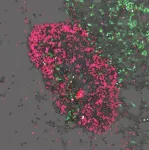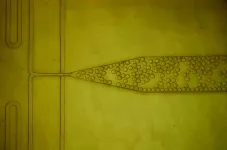Better metric for prioritizing conservation of “evolutionarily distinctive” species
EDGE2 adds measures of scientific uncertainty and status of related species to existing metric
2023-02-28
(Press-News.org) An updated metric for prioritizing species’ conservation that incorporates scientific uncertainty and complementarity between species, in addition to extinction risk and evolutionary distinctiveness, is publishing February 28th in the open access journal PLOS Biology, authored by Rikki Gumbs from the Zoological Society of London (ZSL), UK, and colleagues.
In 2007, ZSL established the Evolutionarily Distinct and Globally Endangered (EDGE) metric to prioritise species for conservation based on preserving evolutionary history embodied within endangered species. The approach allocates each species a score based on the evolutionary distance, measured in millions of years, that separates a species from its closest living relatives, and its conservation status in the IUCN Red List.
EDGE has since been applied to mammals, amphibians, birds, sharks and rays, corals, and flowering plants, and is used to allocate conservation funding. To update the EDGE metric to incorporate recent advances in evolutionary biology and conservation, ZSL hosted a workshop for conservation scientists and practitioners, who reached a consensus on EDGE2 – an updated metric that includes the extinction risk of closely related species and uncertainty in species’ relationships and conservation status.
Applying the EDGE2 methodology to 6,253 mammal species, the researchers found that the Mountain Pygmy Possum (Burramys parvus) scored highest, representing 25 million years of evolution at critical risk of extinction. They identified 645 priority species that together account for 81% of the evolutionary diversity at risk. Protecting the 100 highest ranking species from this list – representing 1.6% of all mammal species – would preserve over 700 million years of evolutionary history.
EDGE2 lists can help guide the effective and practical prioritization of limited conservation funds to preserve distinctive evolutionary features and ecological functions, the authors say. They also propose an EDGE2 research list, calling for further research on species that are evolutionarily distinct, but whose conservation status is unknown.
Gumbs adds, “The variety of life at which we marvel is the product of the shared and unique evolutionary histories of species past and present, yet many of the most evolutionarily distinct species on Earth today are at risk of extinction. We brought together experts in conservation science and practice to create a robust and coherent framework to prioritise the world’s most evolutionarily distinct species for conservation action, and applied the framework to produce an updated prioritisation of the world’s mammals.”
#####
In your coverage, please use this URL to provide access to the freely available paper in PLOS Biology: http://journals.plos.org/plosbiology/article?id=10.1371/journal.pbio.3001991
Citation: Gumbs R, Gray CL, Böhm M, Burfield IJ, Couchman OR, Faith DP, et al. (2023) The EDGE2 protocol: Advancing the prioritisation of Evolutionarily Distinct and Globally Endangered species for practical conservation action. PLoS Biol 21(2): e3001991. https://doi.org/10.1371/journal.pbio.3001991
Author Countries: United Kingdom, United States of America, Australia, Canada, Germany, New Zealand
Funding: RG was funded by the Natural Environment Research Council Science and Solutions for a Changing Planet Doctoral Training Programme (grant number NE/L002515/1), the CASE component of which was funded by the Zoological Society of London - https://www.imperial.ac.uk/grantham/education/science-and-solutions-forachanging-planet-dtp/. The funders had no role in study design, data collection and analysis, decision to publish, or preparation of the manuscript.
END
ELSE PRESS RELEASES FROM THIS DATE:
2023-02-28
A review of evidence from prior research provides new support for the possibility that the evolution of larger brains in some species was enabled through increased energy investment by parents in their offspring. Carel van Schaik of the Max Planck Institute for Animal Behavior in Konstanz, Germany, and colleagues present their arguments in a paper publishing February 28th in the open access journal PLOS Biology.
Between different species, larger relative brain size is associated with cognitive benefits that favor survival. However, larger brains ...
2023-02-28
Multiple factors including a women’s age, marriage status, education and how many living children she has, are associated with pregnancy termination in low- and middle-income countries, according to a new study published this week in the open-access journal PLOS Global Public Health by Djibril Ba of Penn State College of Medicine, US, and colleagues.
In low- and middle-income countries (LMICs), a woman’s decision to terminate a pregnancy is often impacted by a patriarchal structure of society, restrictive abortion laws, cultural and religious beliefs and economic factors. About 45% ...
2023-02-28
An MUSC Hollings Cancer Center research team has created what team members believe to be among the first small molecules designed to stimulate immune cells to fight cancer. More importantly, these compounds inhibit a specific enzyme that hasn’t been targeted with small molecules for the treatment of cancer.
Small molecules are, quite literally, small. They’re hundreds of times smaller than monoclonal antibodies currently used in therapy, and they’re also structurally much simpler. Because of their low molecular mass, they are much more likely to enter cells. Aspirin, for example, is a small molecule ...
2023-02-28
People who became carers during Covid-19 by helping family members, friends or neighbours in need experienced a sharp decline in their own mental health, new research from Lancaster University reveals.
Using the General Health Questionnaire (GHQ) scale – a psychometrically validated and widely used index of psychological distress – researchers studied individual responses to the UK Household Longitudinal Study (Understanding Society).
They looked at 4698 participants from a total of 11 surveys - three before COVID-19 and eight collected between April 2020 ...
2023-02-28
Research by a team that includes two faculty members from the University of Colorado School of Medicine may change the treatment paradigm for patients with eosinophilic esophagitis (EoE), an allergic condition that causes chronic inflammation in the esophagus that can lead to esophageal narrowing and dysfunction.
Glenn Furuta, MD, professor of pediatric gastroenterology, hepatology, and nutrition, and Paul Menard-Katcher, MD, associate professor of gastroenterology, helped lead the National Institutes of Health (NIH)-funded, multisite study that shows that a single-food ...
2023-02-28
CAMBRIDGE, MA -- One of the most expensive steps in manufacturing protein drugs such as antibodies or insulin is the purification step: isolating the protein from the bioreactor used to produce it. This step can account for up to half of the total cost of manufacturing a protein.
In an effort to help reduce those costs, MIT engineers have devised a new way to perform this kind of purification. Their approach, which uses specialized nanoparticles to rapidly crystallize proteins, could help to make protein drugs more affordable and accessible, especially in developing ...
2023-02-28
INBRAIN Neuroelectronics, a Graphene Flagship spin-off company, has been named Spain’s most innovative company by leading Spanish news publication El Periódico.
INBRAIN exists to decode and modulate neural networks to improve patients’ lives. More specifically, INBRAIN is harnessing the unique properties of graphene to develop high density and high-resolution brain interfaces coupled to an intelligent system with high signal processing power to provide breakthrough neuroelectronic therapies.
The company was founded in 2020 by researchers from Graphene Flagship partner the Catalan Institute of Nanoscience ...
2023-02-28
DETROIT (February 28, 2023) – The Henry Ford Medical Group today announced Brien J. Smith, M.D., MBA, a national expert in neurology and epilepsy, as its new Chair of the Department of Neurology.
In this leadership role, Dr. Smith will oversee all clinical, research and administrative services for the Department of Neurology at Henry Ford Health. A veteran of Henry Ford, Dr. Smith was previously part of Henry Ford Hospital’s Neurology Department for 18 years, serving as Director of the Epilepsy Monitoring Unit, Medical Director of the Comprehensive Epilepsy Program, and Director of the Clinical Neurophysiology Program at Henry Ford Hospital in Detroit. He ...
2023-02-28
Images
Ankle exoskeletons that can help people extend their endurance are a step closer to reality with a new control algorithm, developed at the University of Michigan, that could enable future exoskeletons to automatically adapt to individual users and tasks. This would reduce or eliminate the need for manual recalibration.
Current exoskeletons are limited because they must be tailored to a single user performing a single task, like walking in a straight line. Any changes require a lengthy set ...
2023-02-28
ROCHESTER, Minn. — Being overweight impacts your heart health in more ways than you might think. A new JACC review paper from Mayo Clinic outlines how obesity affects the common tests used to diagnose heart disease and impacts treatments. Cardiovascular disease is the leading cause of death in the U.S. and globally, yet it is largely preventable.
"Excess fat acts as a kind of filter and can skew test readings to under-or overdiagnosis," says senior author Francisco Lopez-Jimenez, M.D., director of preventive cardiology at Mayo Clinic. "Obesity affects ...
LAST 30 PRESS RELEASES:
[Press-News.org] Better metric for prioritizing conservation of “evolutionarily distinctive” species
EDGE2 adds measures of scientific uncertainty and status of related species to existing metric






